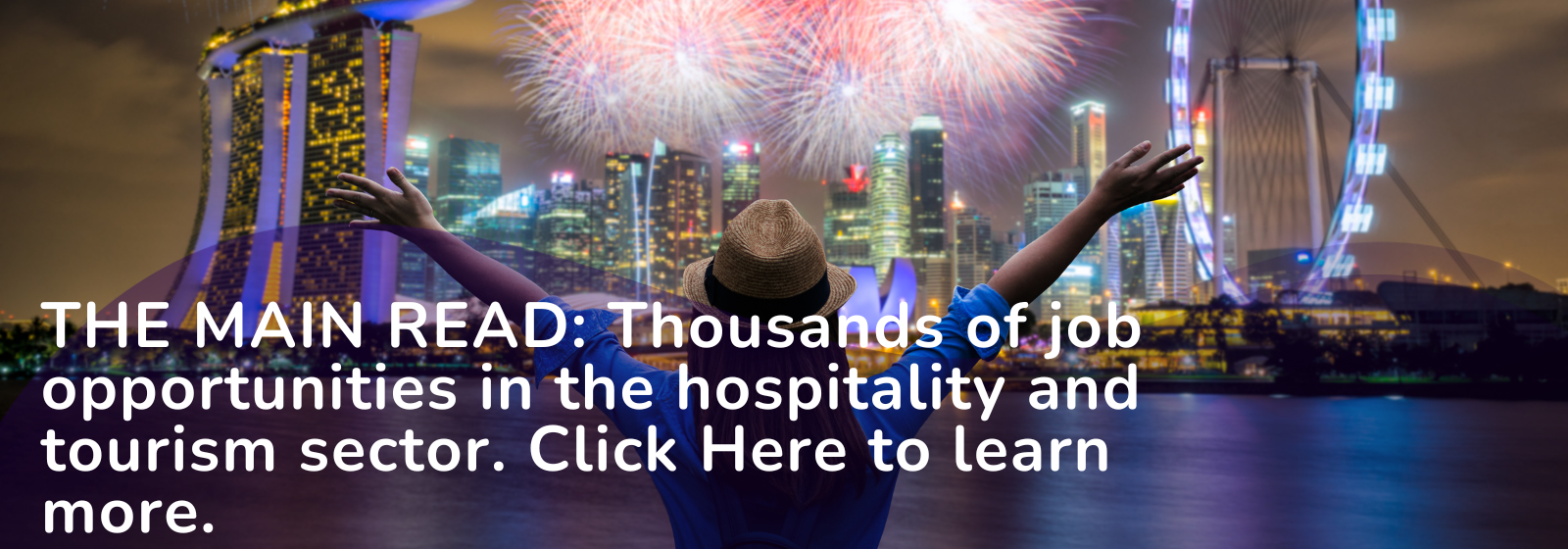Tourism is one of the largest industries in the world and many countries rely heavily on it to drive the economy. With international travel restrictions getting back to normal, tourism is seeing a boost in activity as people are excited to leave their homes and see some of the world after two years.
In Singapore, the resilience of the travel industry is also a positive sign that we’re ready for recovery. The tourism industry boom means that many organisations will require more manpower to accommodate the growing demand.
If you have the transferable skills and experience or willingness to learn then considering a mid-career switch here can offer a unique turn in your professional life.
There are many subsets of the tourism industry. These include transportation, accommodation, food and beverage, entertainment, and connected industries. Evidently, there is much overlap with the hospitality industry, which is also experiencing rapid growth at present.
But the difference between the two lies primarily in the target audience; hospitality caters to all customers, while tourism particularly thrives on those who are visiting a location.
The diverse range of roles and responsibilities means there is something for anyone looking for a career change. To help you understand whether a mid-career switch to the tourism industry is right for you, we have put together some key information about training, experience, skillsets, and knowledge that potential switchers should know about.
1. Understand your skillset
You may not have been in the tourism industry for the last 10 years, but that doesn’t mean you have nothing to contribute to a company. There are many transferable skills that businesses are looking for in candidates. By highlighting them, you can make a seamless career change.
Some key soft skills include:
- Verbal communication
- Time management
- Teamwork
- Conflict-resolution
- Problem-solving
Technical skills that you may possess include:
- Presentation
- Proficiency in a foreign language
- Knowledge of travel regulations and laws
- Competency in Microsoft Office Suite, accounting and scheduling software.
WIth many bookings, research, and data analytics being performed digitally, basic computer skills are definitely an essential for a career change to tourism.
2. Upskill and reskill as required
Not all jobs in the tourism industry require a qualification, but if you’re making a mid-career switch, then having the backing of a certificate or diploma will demonstrate a degree of competency to a hiring manager.
The Singapore Workforce Skills Qualifications (WSQ) certifications for tourism is the perfect place to start. Areas of study include attractions, MICE and events management, and even spa services.
Certifications aside, your current qualification can also bode well for your new career. A business or accounting degree, for example, will benefit a travel planner or hotel manager. Those with certified knowledge in Information Technology can join the sector and contribute to the development of virtual tourism platforms.
That said, it’s not surprising that you’d still be required to upskill or reskill, depending on the line of work you opt for.

3. Acquire industry knowledge and connections
Connecting with people in the travel industry may be an effective practice to boost your chances of landing a job. Knowing more industry professionals may lead to work opportunities that are not widely advertised, which can help you acquire thoughtful recommendations.
Joining online forums devoted to your upcoming travel career or attending local events can help you network with the right individuals, who can open doors of opportunities.
These networking events will also provide you with a better idea of how the tourism industry works and how each sub-group is interconnected. You’ll get to hear behind-the-scenes experiences of life in the tourism industry and potentially come across successful career switchers who can offer advice on landing that first job.
Wondering if the hospitality and tourism sector is your calling? Take this quiz to find out!
You may also utilise social media to grow your network by sharing trip images and anecdotes, starting with LinkedIn.
Like any industry, tourism has its own community and customs. By familiarising yourself with them, you can better discuss how you would fit into an industry culture in an interview. This will prepare you for the workplace and all that entails.














